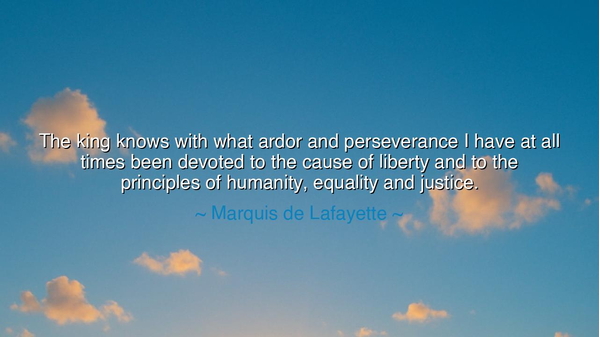
The king knows with what ardor and perseverance I have at all
The king knows with what ardor and perseverance I have at all times been devoted to the cause of liberty and to the principles of humanity, equality and justice.






In the grand narrative of history, where kings and commoners alike have fought for the ideals of liberty, equality, and justice, there are few figures whose commitment to these principles shines as brightly as that of the Marquis de Lafayette. "The king knows with what ardor and perseverance I have at all times been devoted to the cause of liberty and to the principles of humanity, equality, and justice." These words, spoken with the fervor of a man whose heart was bound to the ideals of the Revolution, speak to the unwavering dedication to a cause greater than oneself—a cause that transcends borders, generations, and personal cost. Lafayette, who stood not only as a soldier but as a symbol of freedom, represents the heroism of those who fight, not for personal glory, but for the liberation and empowerment of all.
In these words, we find a deep truth about the nature of true devotion. Lafayette's commitment to liberty was not born out of a desire for power or prestige, but from a deep, unshakable belief in the inherent rights of all people. In the ancient world, heroes like Hercules or Achilles were often celebrated for their strength in battle, yet their true valor lay not in their might alone, but in their sacrifice for something larger than themselves. Lafayette, too, embodied this heroism—not in the battlefields of the American or French Revolutions, but in his unwavering devotion to ideals that would shape the very foundation of modern society. He did not seek the honors of kings, but the fulfillment of a greater promise for humanity.
Let us take a step into history to see the significance of Lafayette's actions. In the heat of the American Revolution, Lafayette, a young and noble Frenchman, was so moved by the American struggle for independence that he sailed across the seas to fight alongside them, despite knowing little of the land or its people. He was not swayed by the promise of wealth or recognition but was driven by a singular cause—the belief that freedom and equality were universal, transcendent ideals. This was not a mere romantic notion; it was a call to action, one that would shape the course of nations and future generations. Lafayette’s sacrifice on foreign soil, fighting for the freedom of a new nation, was an act of humanity in the truest sense—a commitment to the principles of justice, even at great personal cost.
This same devotion to the ideals of liberty would carry Lafayette back to France, where he became a central figure in the early stages of the French Revolution. His efforts, however, were not without sacrifice. In a world torn apart by political upheaval, Lafayette’s belief in equality and justice would lead him to clashes with both royalists and radical revolutionaries. He would be caught between competing forces, each claiming to fight for the principles he held dear, yet often acting in ways that betrayed those very ideals. In these trials, Lafayette’s true courage was shown—not in his victories on the battlefield, but in his ability to remain true to the higher principles of humanity, even when those around him abandoned them for political gain.
Lafayette’s story calls us to reflect on the meaning of true dedication. Liberty is not a mere political term; it is the sacred right of every human being to be free from oppression. Equality is not an abstract ideal, but a fundamental truth that all people, regardless of their birth or station, deserve the same rights and opportunities. Justice, in its truest form, is not simply the application of law, but the recognition of each individual’s inherent dignity. Lafayette did not fight for a fleeting victory, nor did he seek to shape the world in his own image; he fought for these ideals, knowing that they would shape the lives of millions who would come long after him.
The lesson we can draw from Lafayette’s devotion is one of unyielding commitment to the principles of freedom and justice. True heroism is not found in the pursuit of personal gain, but in the tireless, selfless pursuit of ideals that benefit all of humanity. The struggles we face in our own time, whether in the fight for social equality, political freedom, or justice for the oppressed, require the same ardor and perseverance that Lafayette exhibited in his life. To stand firm in the face of adversity, to remain true to what is right even when the winds of change blow strong, is the true calling of any individual who seeks to make the world a more just place.
So, let us remember the example of Lafayette, and in our own lives, let us strive to be unwavering in our commitment to liberty, equality, and justice. Whether in our personal relationships, our communities, or the larger world, we are all called to act with integrity and devotion to these principles. May we, too, be able to look back on our lives and say, as Lafayette did, that we have devoted ourselves with ardor and perseverance to the cause of humanity. And in doing so, we honor not only those who came before us, but also the generations who will inherit the fruits of our struggle for a better, more just world.






AAdministratorAdministrator
Welcome, honored guests. Please leave a comment, we will respond soon